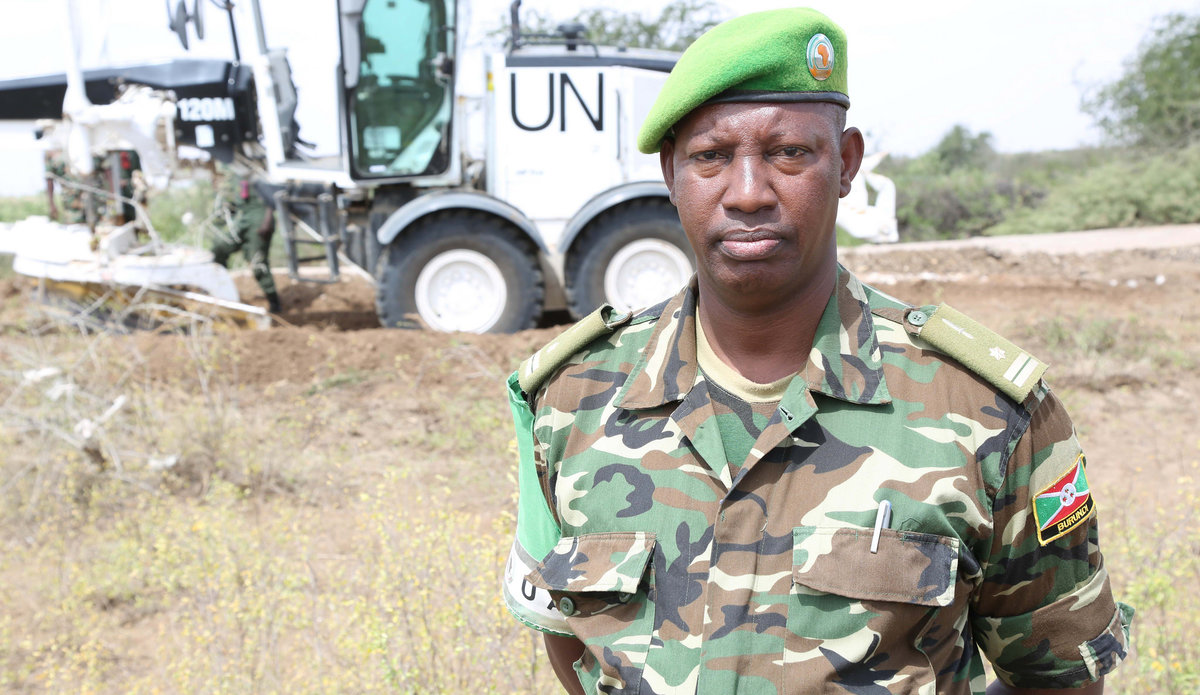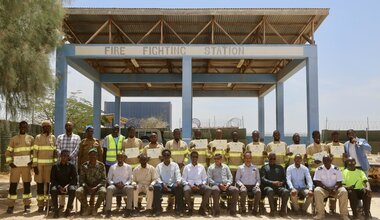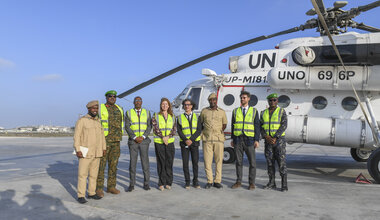AMISOM and UNSOS launch Operation Antelope in HirShabelle region
The African Union Mission in Somalia (AMISOM) and the United Nations Support Office in Somalia (UNSOS) jointly embarked on a major operation to open key supply routes in HirShabelle region.
The two organizations intend to open the routes to support the local population and to assist the military access its Forward Operating Bases (FOB) in the region.
The AMISOM Force Engineer, Colonel Kazela Kazela, said experts identified key priority roads, which if rehabilitated would ease movement of troops, humanitarian agencies and the general population.
Col Kazela said AMISOM is focusing on the road network because it had become expensive to deliver rations and supply by air.
“This will enable AMISOM, the local population and aid agencies to move faster (and more efficiently) compared to airlifting supplies and personnel,” the Force Engineer added.
AMISOM started with the rehabilitation of the road from Jowhar Airfield to Jowhar town and Jalalaqsi Airport to ease movement of equipment and logistical support.
Officers from the Burundi contingent, responsible for security in the region, were trained to handle the project.
“We trained the Burundian Mission Enabling Unit before moving to the site,” Col Kazela said.
Major Raymond Kemei from the Mission Enabling Unit said the rehabilitation and opening up of the roads would boost commerce in the region because the local population will be able to buy and sell goods and services easily.
HirShabelle is one of the richest agricultural areas in Somalia producing a wide range of food crops like, bananas, mangoes, watermelons and tomatoes. The region is also known for its high quality livestock, which is exported to markets in Saudi Arabia and the Middle East.
Major Kemei further stated that opening the routes would enable security agencies respond to emergencies faster and enable humanitarian agencies access the population in areas that have been cut off from the road infrastructure for many years.
The launch of the Operation Antelope was supervised by Sector Commander Brigadier-General, Venuste Nduwayo, who said the Burundi Contingent would implement the three-month project.
By December 24, more than 12 kilometres had been rehabilitated on the Jowhar Airfield-Jowhar town route after works began on December 1, 2016. The work began after the Special Representative of the Chairperson of the African Union Commission (SRCC), Ambassador Francisco Madeira visited HirShabelle to discuss security and infrastructure matters with President Ali Abdullahi Osoble.
Operation Antelope is not without challenges. The key artery to Jowhar town, Sabuum bridge was hit by a landmine.
“We are sourcing funding to repair the bridge which was damaged by a landmine,” Col Kazela said, noting that once it is fixed the team on the ground would move faster.
He said AMISOM soldiers were working closely with officials from the Civilian-Military Co-ordination (CIMIC) Unit to engage the local population in reaping the benefits of the project.
AMISOM provides personnel for the project, while UNSOS provides the equipment being used to rehabilitate the roads. The United Nations Mine Action Service (UNMAS) provides mentorship on the handling of Improvised Explosive Devices (IEDs).
Benefits of Operation Antelope
- Deter planting of Improvised Explosive Devices (IEDs)
- Enhance security in HirShabelle
- Ease movement of people and goods
- Enhance reaction time to security threats
- Faster response by humanitarian agencies
 UN
UN





